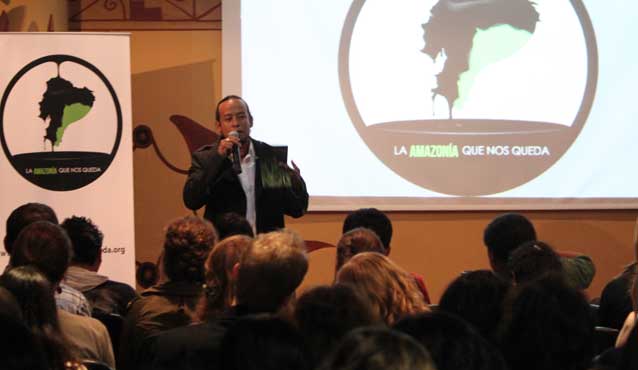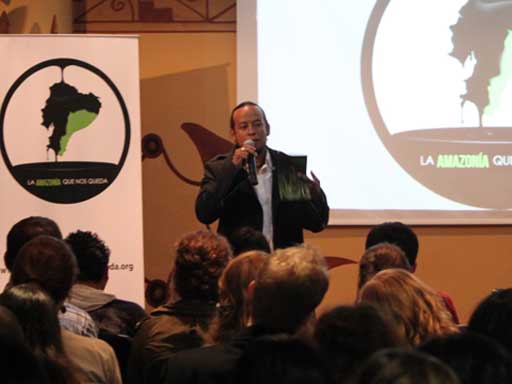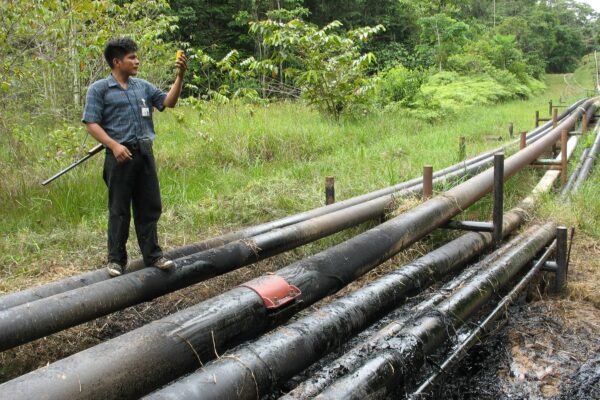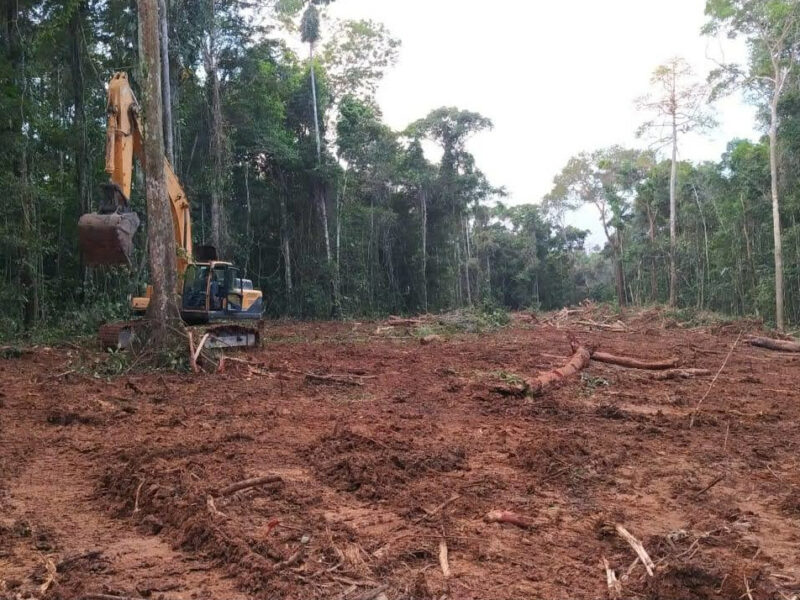
Take Action Now!
Send a letter urging President Correa to respect indigenous rights and the rights of nature.
Amazon Watch and Ecuadorian partner organizations Fundación Pachamama and CDES (Center for Economic and Social Rights) held an event yesterday evening at the Mindalae Museum in Quito to launch a joint campaign against the XI Oil Round in Ecuador. The grassroots campaign, roughly translated as “Ecuador’s Last Remaining Rainforest”, is a combined effort to raise awareness in Ecuador of the destructive impact the Ecuadorian government’s proposed XI Round would have on the pristine rainforest environment of the south-central Amazon and the indigenous peoples who live there.
The event was timed to coincide with Yasuní Day in Ecuador. So much national and international attention has focused on the protection of Yasuní National Park and the government’s Yasuni-ITT program that proposes refraining from extracting oil from under the park if enough funds are paid by wealthy nations to Ecuador. Meanwhile in the south central Ecuadorian Amazon, an area of unspoiled and highly biodiverse rainforest many times larger than Yasuní National Park is greatly threatened by the XI Oil Round.
The XI Oil Round, or Ronda Sur Oriente, is the auction of 16 oil blocks to state and private companies in an area previously free of oil extraction. The nearly ten million acres up for auction cover some of Ecuador’s last remaining primary tropical forests. It is estimated that 85% of the territory slated for inclusion in the XI Oil Round is virgin rainforest. The area is home to seven indigenous nationalities – Shuar, Achuar, Kichwa, Shiwiar, Andoa, Zápara, and Waorani – who depend upon their natural environment for their cultural survival. For many of these indigenous groups, oil extraction in their territory on the scale proposed by the government could mean their extinction. The Zápara people, for example, number around 200 individuals in Ecuador. 100% of Zápara territory is currently up for auction.
Raising awareness among Ecuadorians of the threat this oil round represents to the last remaining pristine rainforest in Ecuador and its unique indigenous cultures is one of the primary goals of this campaign. It is they, the citizens, who can most effectively pressure their government to halt the destructive trend of environmentally harmful resource extraction for short-term monetary gain. As Eduardo Pichilingue, coordinator for the Collective Rights Monitoring Group at CDES, and a speaker at the event, said, “There is something deeply wrong about a development model that violates the human rights of some of the poorest and most marginalized people on the planet while benefiting foreign companies and individuals that earn billions upon billions of dollars.” And it’s true: Chevron’s revenue for 2012 dwarfs Ecuador’s GDP for the same year. It is also important to contradict the government’s claims that oil will lift the nation out of poverty, especially in light of their failure to develop energy alternatives for a post-oil society. The estimated oil reserves in the area up for auction would only last two to eighteen days at current global consumption rates.
Almost 200 people filled the event room at the Mindalae Museum to listen to speakers from the organizations involved in the campaign as well as indigenous youth leaders who traveled from their Amazonian communities to the event. They then watched a short film about the XI Round produced by filmmaker Siegmund Thies, listened to music performed by local musicians, and viewed a photo exhibit arranged by the three organizations. The exhibit, titled Ecuador’s Last Remaining Rainforest: Black and Green in Contrast, displayed photos of the landscapes, biodiversity, and native cultures of the south-central Amazon region, as well photos of the legacy of contamination, illness, and social conflicts in the northern Amazon, a region with a devastating history of oil extraction. The exhibit will remain at the Mindalae Museum for the rest of month, where it will be visited by school groups from across Quito, before it travels on to different parts of the country.
Amazon Watch will continue to work with partner organizations in Ecuador to advocate for the rights of Ecuador’s indigenous peoples, promote awareness of what’s at stake if the XI Oil Round moves forward, alert interested companies to the serious risks associated with investment in these oil blocks, and pressure the government to halt the oil round. The Amazon rainforest is a national and global treasure; its disappearance will irreversibly affect the whole planet. As Marlon Vargas, a youth leader of the Achuar nationality, said, “If the forest disappears, so do we; but we don’t just defend it for ourselves, we do it for the well-being of all humanity.”














